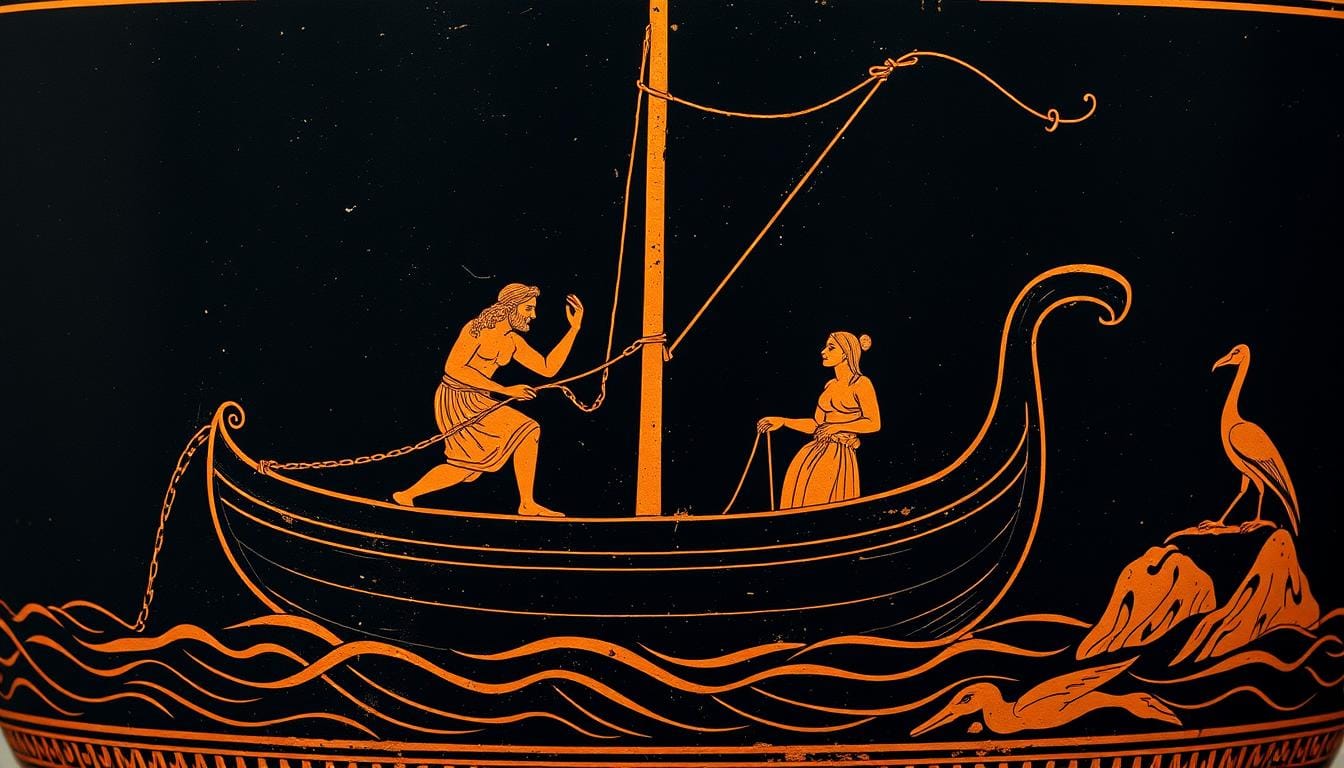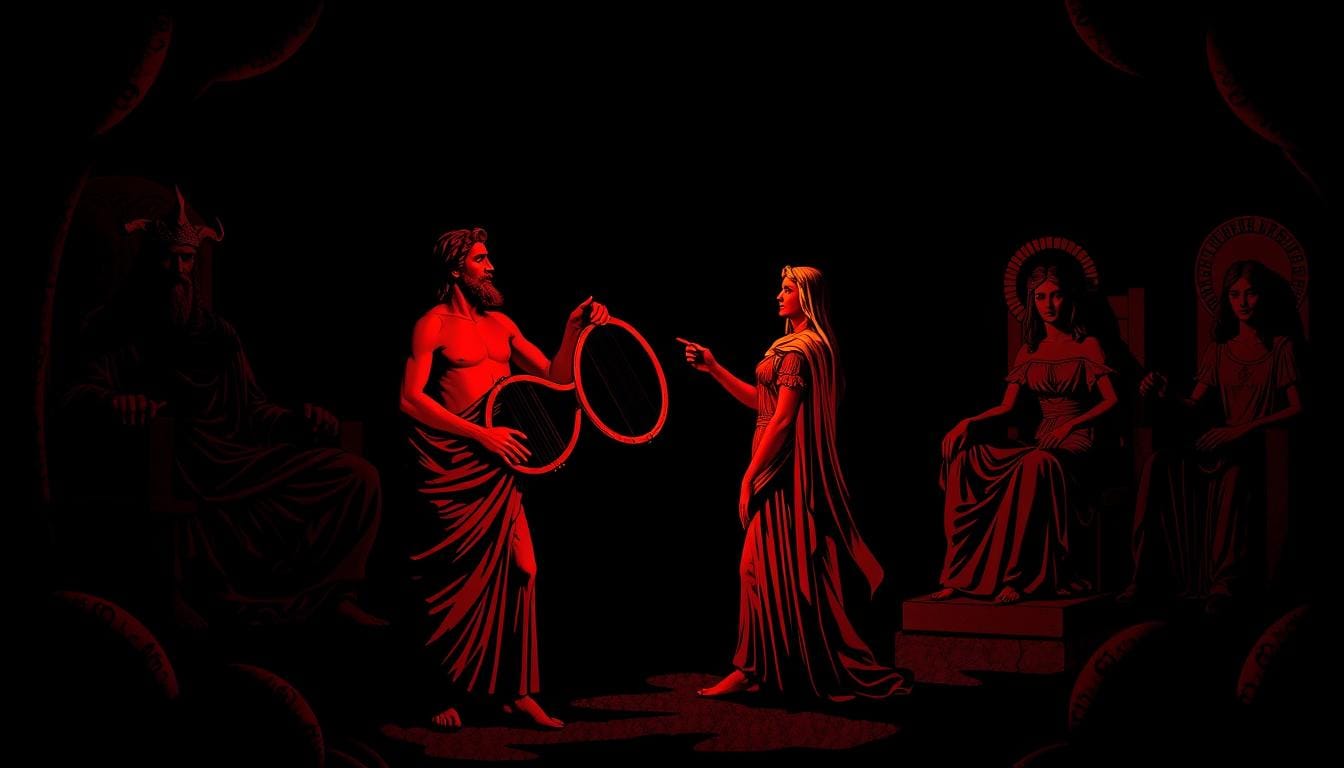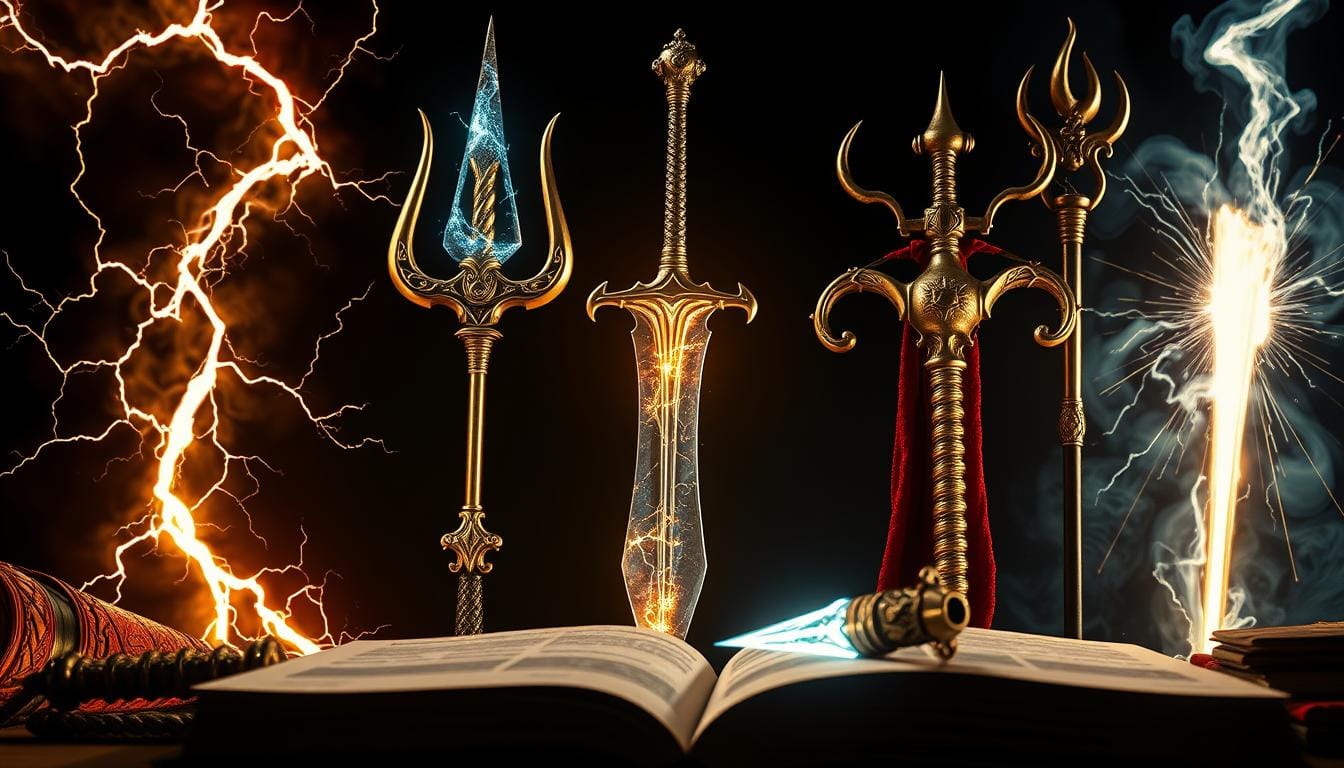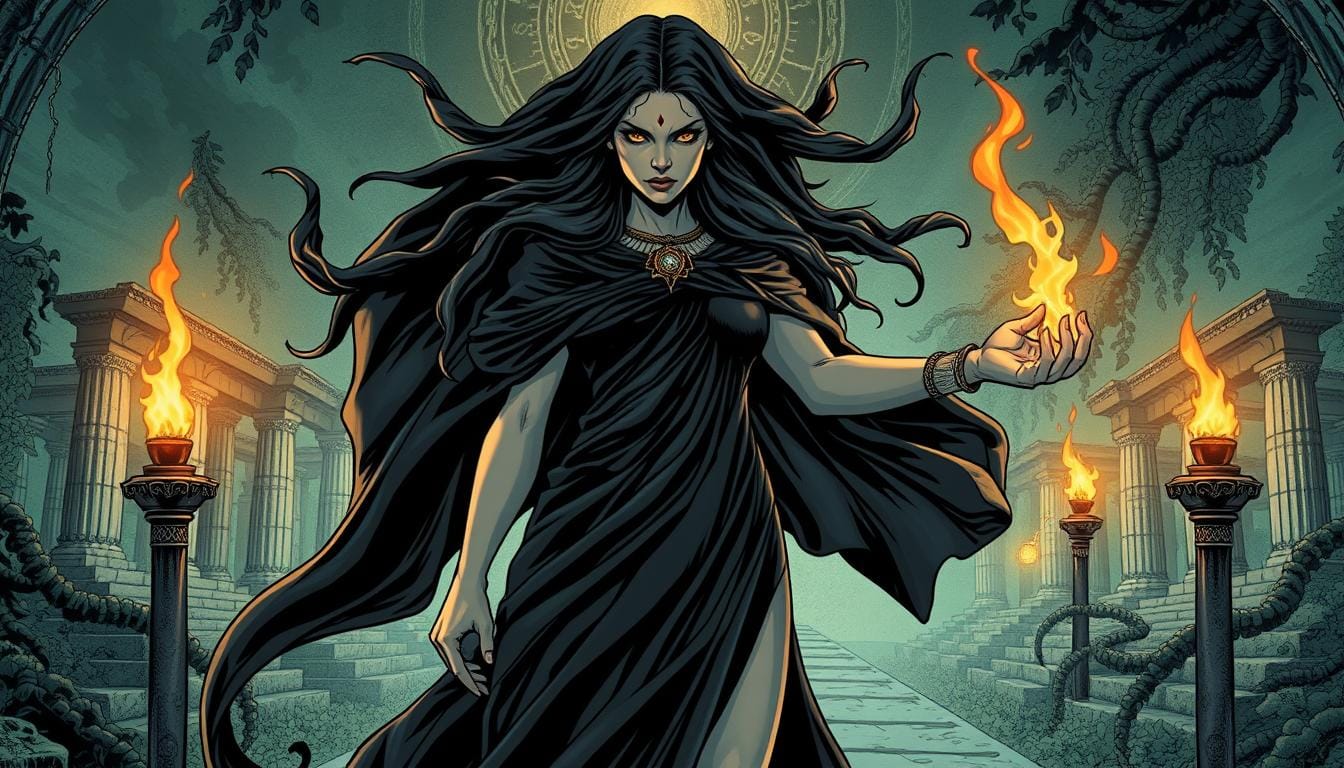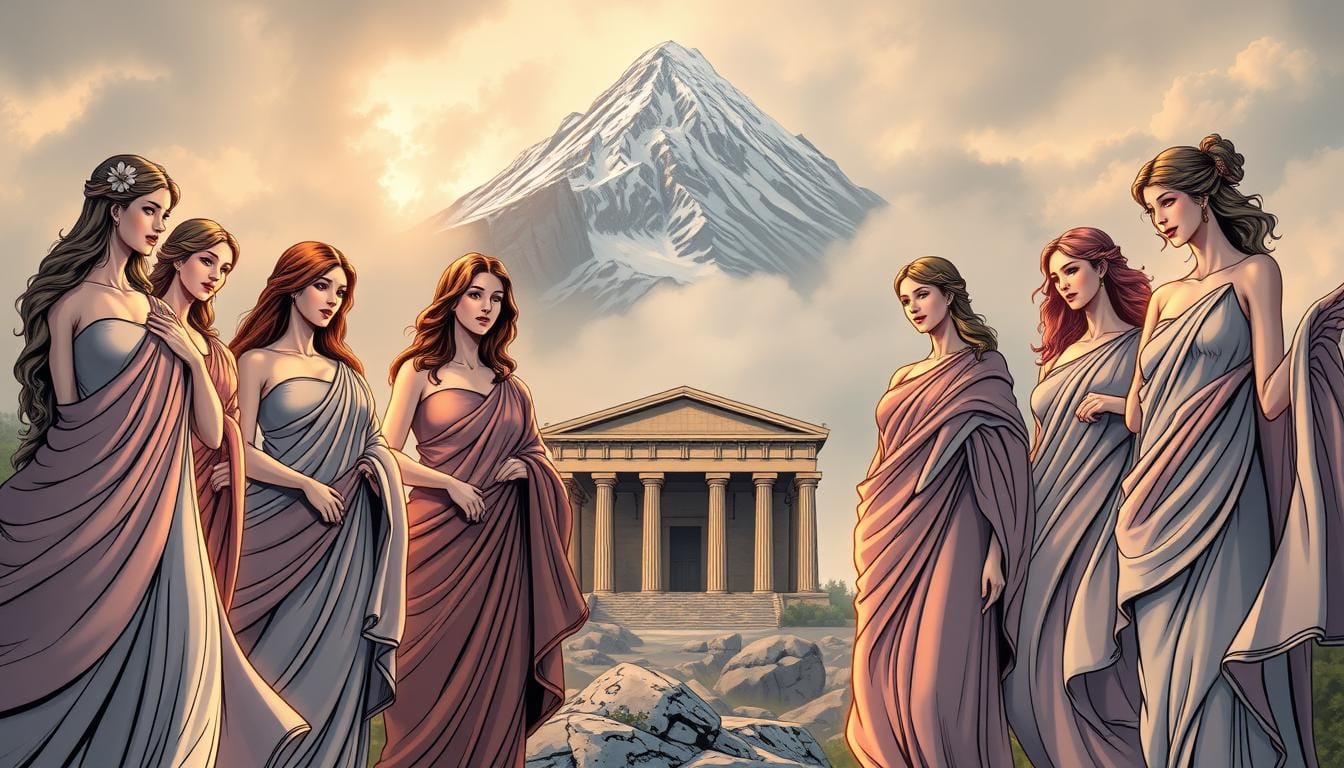Did you know ancient Greek women made their most sacred vows to Hera, not Aphrodite? This Greek goddess had more temples and followers than almost any other god.
We’re exploring the story of a complex figure in mythology. Born to Titans Cronus and Rhea, Hera was destined for greatness.
Her marriage to Zeus was more than love. It was a political alliance that changed Mount Olympus. Hera’s mix of care and strength makes her fascinating.
In Athens’ markets and Argos’ temples, Hera’s impact was everywhere. She influenced ancient Greek views on marriage, family, and women’s roles, affecting us today.
Key Takeaways
- Hera was the queen of the Olympian gods and primary goddess of marriage and family
- She was born to Titans Cronus and Rhea, making her Zeus’s sister and wife
- Ancient Greek women mainly worshipped her for marriage blessings and protection
- Her temples and cult sites existed throughout the ancient Greek world
- She represented both nurturing feminine power and fierce protective instincts
- Her influence shaped ancient Greek society’s views on marriage and family structures
Divine Origins and Rise to Power as Queen of Olympus
Hera was born into a world where her father saw children as threats. Her journey to become queen of olympus was filled with survival and smart moves. Her story is a powerful example of how to go from being a victim to a strong leader.
Hera learned that true power isn’t just about being born into a royal family. It’s about knowing how to navigate tough family politics and come out on top.
Birth as Daughter of Cronus and Rhea
Hera was born to the Titan rulers Cronus and Rhea. But, there’s debate over if she was the eldest or if Hestia was. What’s clear is that her early life was marked by fear, as her father swallowed each child after birth.
This scary start shaped Hera’s character deeply. Unlike many, she didn’t have a peaceful childhood. She learned to survive from the start. When Zeus freed his siblings, Hera emerged as a goddess ready for the harsh world of divine politics.
Marriage to Zeus and Ascension to Divine Royalty
Hera and Zeus’s marriage was more than a love story. It was a strategic masterpiece that changed the divine world. Their union, known as hieros gamos, brought together two powerful divine forces.
Hera was raised by different gods after her rescue. Some say it was Oceanus and Thetys, while others point to Temenus. This diverse upbringing gave her unique insights into ruling the divine world.
When Hera married Zeus, she didn’t just become his wife. She became his equal partner in ruling. The sacred marriage festivals celebrated their union and the establishment of divine authority over gods and mortals.
Establishing Authority Among the Twelve Olympians
Becoming queen of olympus wasn’t just about marrying Zeus. Hera had to prove herself among the Twelve Olympians. She did this through intelligence, determination, and a strong sense of her own worth.
Hera’s power went beyond being Zeus’s wife. She became the ultimate arbiter of divine justice in matters of marriage and family. Her authority was respected and sometimes feared by other Olympians. She knew that in ancient mythology, survival meant shaping power structures, not just adapting to them.
Hera's Sacred Domains and Divine Responsibilities
Hera’s domains show her wide influence in ancient Greek life. As the goddess of marriage and queen, she controlled key aspects of society. Her duties went beyond rituals, covering legal, spiritual, and protective roles in family life.
Her impact was deep in ancient Greek culture. Hera’s power was real, affecting the daily lives of those who sought her favor.

Guardian of Marriage and Matrimonial Sanctity
Hera guarded marriage, being the divine champion of true relationships. She led wedding ceremonies, known as Gamelia, to bless and legitimize unions. Her protection lasted throughout marriage, not just at the start.
The goddess of marriage was serious about her role. She settled disputes and defended wives’ rights in a society where women’s rights were often in doubt. Hera’s titles, Teleia and Zygia, highlighted the sacred bond between spouses.
“Marriage is not just a union of two people, but a sacred covenant that requires divine protection and guidance.”
Fertility Deity and Protector of Childbirth
As a fertility deity, Hera focused on nurturing and protecting life. Under Eileithyia, she guided women through childbirth, a dangerous time. Her role was highly respected in Argos and Athens.
Her presence in childbirth offered safety during a vulnerable time. Women called on Hera’s strength during pregnancy and delivery. She blessed families with children and ensured their safety.
Royal Power and Divine Justice Administration
Hera’s connection to royal power made her unique among fertility deities. She wasn’t just about fertility; she also administered divine justice and kept social order. As Queen of Olympus, her decisions on family disputes and marriage law carried weight.
Hera’s mix of maternal care and royal authority made her a powerful figure. She protected legitimate relationships and family stability. Her justice was swift, defending marriage and wives’ rights.
Through her domains, Hera became more than Zeus’s wife. She became the symbol of family values and social order in ancient Greece.
Sacred Symbols and Ancient Worship of the Greek Goddess
The ancient world was filled with symbols that told stories of Hera’s power. These symbols were more than just decorations. They spoke of her divine authority, protection, and the sacred bonds of marriage.
The Peacock Symbol and Its Mythological Significance
The peacock symbol is Hera’s most famous emblem. It holds a deep meaning beyond its beauty. The Greeks saw the peacock’s tail as a sign of divine wisdom.
Each eye-like pattern on the peacock’s tail showed Hera’s all-seeing nature. She watched over marriages and punished those who broke vows.
The story of Argus, Hera’s hundred-eyed giant, is tied to the peacock. Hera placed Argus’s eyes on the peacock’s tail after Zeus killed him. This made the peacock symbol a reminder of Hera’s watchful gaze.

The peacock symbolized Hera’s role as a protector of marriage. It showed her vigilance and commitment to upholding marriage vows.
Sacred Animals: Cows, Lions, and Cuckoos
Hera’s sacred animals had unique meanings. The cow linked her to fertility and earth goddess worship. It showed her role in protecting childbirth and family lines.
Lions represented her royal authority and protective instincts. These animals showed her strength in defending her domain and seeking justice.
The cuckoo symbolized Hera and Zeus’s complex relationship. It reminded worshippers that even divine marriages started humbly and sometimes deceptively.
Temple Worship and Religious Festivals
Ancient Greeks built temples to honor Hera across the Mediterranean. The Heraion of Samos was one of the largest Greek temples. Its 155 columns created a breathtaking space for worship.
Major cult centers were at Argos, Mycenae, and Samos. These places were pilgrimage destinations for couples seeking divine blessing. The temples were community gathering places for celebrating Hera’s protection over family life.
The Daedala festival at Plataea showed Hera’s quarrel and reconciliation with Zeus. This celebration made Hera’s worship relatable to ordinary couples.
When Romans conquered Greece, they recognized Hera’s power by identifying her with their own Juno. This ensured her legacy continued long after the classical period. The Roman connection preserved many of her sacred symbols and worship practices for future generations.
The Turbulent Divine Marriage: Hera and Zeus's Complex Relationship
The union of Zeus’s wife Hera and the king of gods is a mix of love, power, and betrayal. Their divine marriage shows how personal feelings clash with political needs. It’s like modern power couples dealing with love and public eyes.
This relationship was both a passionate love story and a strategic political alliance. The drama was intense, like something out of a celebrity gossip magazine.
The Political and Personal Dynamics of Their Union
Zeus needed Hera’s support to keep order among the gods. Hera, in turn, needed Zeus’s power to enforce her will. It was a complex political arrangement.
But the personal side was complicated. Their love was mixed with politics. Love and power rarely mix well, even for gods.
Their reconciliations were celebrated in festivals like the Daedala. These events showed that even troubled relationships can find renewal. They offered hope to mortal couples facing their own challenges.
Hera's Legendary Jealousy and Acts of Vengeance
Homer called Hera jealous, stubborn, and quarrelsome. Her jealousy was not just petty. It was a powerful woman’s reaction to public shame.
Her vengeance was aimed at protecting her position. She pursued Zeus’s lovers with hatred, including:
- Leto – prevented her from giving birth to Apollo and Artemis
- Semele – tricked her into asking Zeus to appear in his true form
- Alcmena – delayed Heracles’ birth to deny him his rightful throne
- Io – transformed into a cow and tormented by a gadfly
These acts were not random. They were messages about disrespecting the Queen of Olympus.
Impact on Heroes and Mortals
The relationship between Zeus’s wife and the king of gods deeply affected heroes and mortals. Many epic stories revolved around Hera’s wrath or her favor.
She drove Heracles to madness, causing him to kill his family. She persecuted Dionysus and other children of Zeus. Her influence shaped the destinies of countless heroes.
Zeus sometimes threatened and beat Hera, once hanging her in clouds with anvils on her feet. This showed the power dynamics in ancient Greek marriages. Wives had little legal power, but could influence behind the scenes.
Their story offered both caution and hope to mortal couples. It showed that even gods struggled with jealousy and betrayal, yet could reconcile and renew their bonds.
Legacy and Cultural Impact: From Ancient Greece to Modern Times
Hera’s power has amazed us for centuries. She went beyond ancient greek religion to shape our views on marriage, family, and women’s roles. The goddess among the olympian gods is now a symbol of feminine power worldwide.
Hera’s story touched on universal themes. She dealt with marriage, respect in relationships, and finding balance between personal dignity and social norms.
Roman Adaptation as Juno
When the Romans met Greek culture, they made Hera into Juno. They saw her power as essential for Roman life. This move showed Hera’s influence went beyond ancient greek religion.
Juno became a key Roman deity. She was part of the Capitoline Triad with Jupiter and Minerva. Roman women honored her as Juno Lucina, the protector of childbirth, and Juno Moneta, the guardian of finances.
The Romans broadened Hera’s role. While Greeks focused on her family, Romans saw Juno as a state goddess. She protected the empire, advised leaders, and symbolized Rome’s divine destiny among the olympian gods.
Influence on Western Concepts of Marriage
Hera’s impact on marriage is huge. She made marriage a sacred, legally protected bond. Her worship helped societies protect wives’ rights and establish legitimate succession.
Today, these ideas shape our legal systems. Marriage is seen as a binding contract, with rights and protections for spouses and children. Hera’s temples were early counseling centers for couples seeking divine advice.
| Ancient Concept | Hera’s Influence | Modern Legacy |
|---|---|---|
| Marriage Sanctity | Divine protection of matrimonial bonds | Legal marriage contracts and ceremonies |
| Spousal Rights | Goddess defending wives’ dignity | Modern divorce and property laws |
| Legitimate Succession | Children of divine marriage | Inheritance and custody rights |
| Marital Counseling | Temple guidance for couples | Professional marriage therapy |
Archaeology shows Hera’s worship spread across the Mediterranean. Major temples at Argos, Samos, and elsewhere show her appeal. These sites united communities through shared values of divine feminine power and family.
Modern Interpretations and Feminist Perspectives
Feminist scholars see Hera as a complex figure. She represents both the constraints and power of women in patriarchal societies. Hera’s jealousy is seen as a fight against unfair systems.
This new view changes how we see the olympian gods and their relationships. Hera’s anger is a justified response to injustice. Her strength in fighting for respect is celebrated.
“Hera’s story is not about a jealous wife, but about a powerful woman navigating the constraints of her time while maintaining her authority and dignity.”
Dr. Maria Tatar, Harvard University
Hera’s art has shaped how we see feminine power today. Her images, always majestic and commanding, have influenced how we depict strong women. These images have become templates for female authority, beyond ancient greek religion.
Modern psychology also values Hera’s archetype. She represents the feminine power that demands respect and recognition in relationships. Therapists use her story to teach about healthy boundaries and mutual respect in partnerships.
Hera’s influence is seen in today’s debates on marriage equality, women’s rights, and family structures. Her legacy reminds us of the divine feminine’s demand for recognition, respect, and equal partnership. These themes are as relevant today as they were in ancient times.
Conclusion
Hera is a fascinating figure in ancient mythology. Her story goes beyond jealousy and revenge. She shows us a complex character who kept her dignity and power, even in tough times.
Hera’s importance goes beyond ancient Greece. Her temples in Samos and Argos were famous for centuries. People saw her as a powerful figure over marriage, family, and royal power. These sites show how her influence shaped whole civilizations.
Today, scholars and readers find new meaning in Hera’s stories. Her divine feminine aspects speak to us today. She shows strength in many ways, from quiet endurance to fierce protection of family values.
Her relationship with Zeus mirrors our own struggles. It’s about balancing personal and public life. Hera’s mix of anger and forgiveness shows the depth of human feelings.
From ancient Greek temples to Roman shrines for Juno, Hera’s legacy lives on. Her story is relevant today because it explores power, dignity, and the lengths we go to protect what’s important. Her complex nature keeps drawing in new generations.
